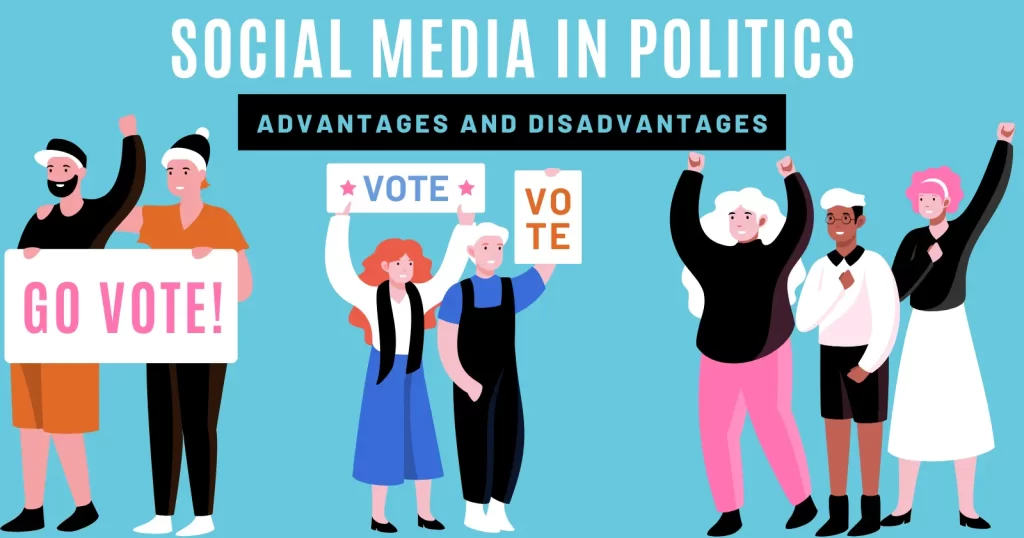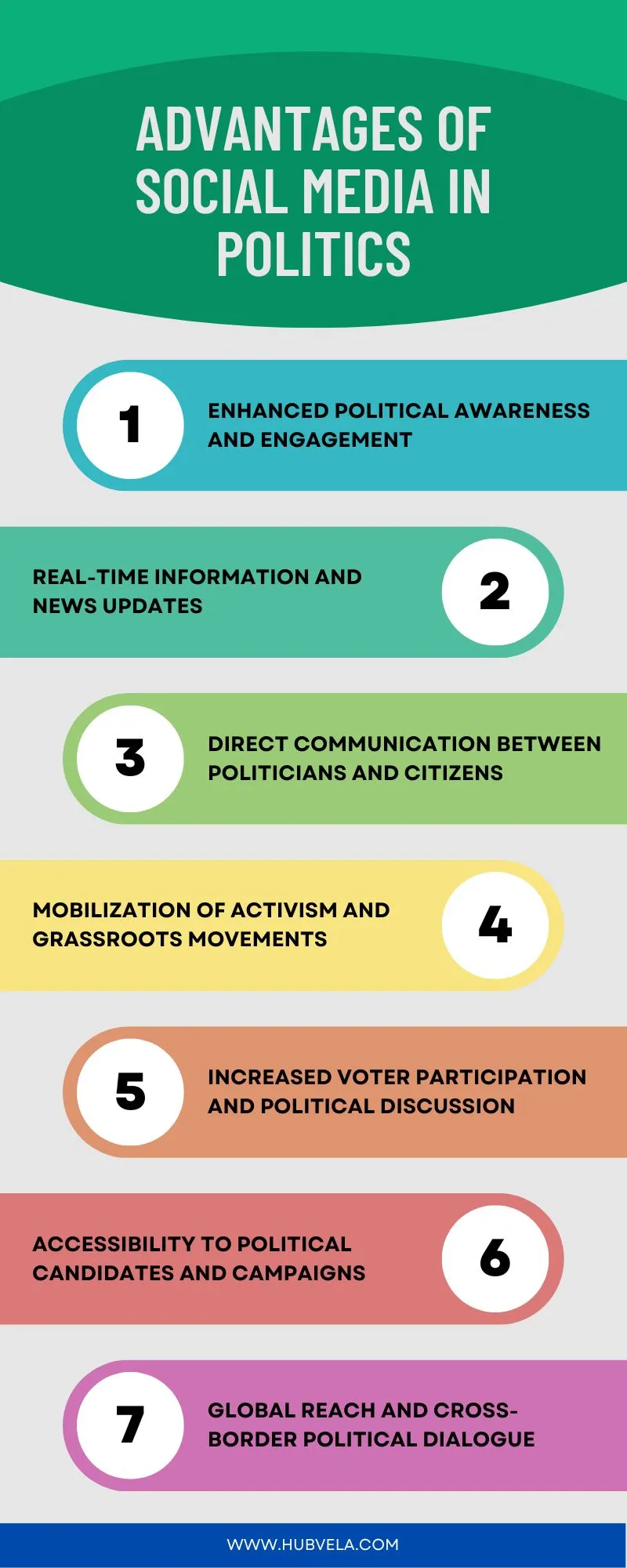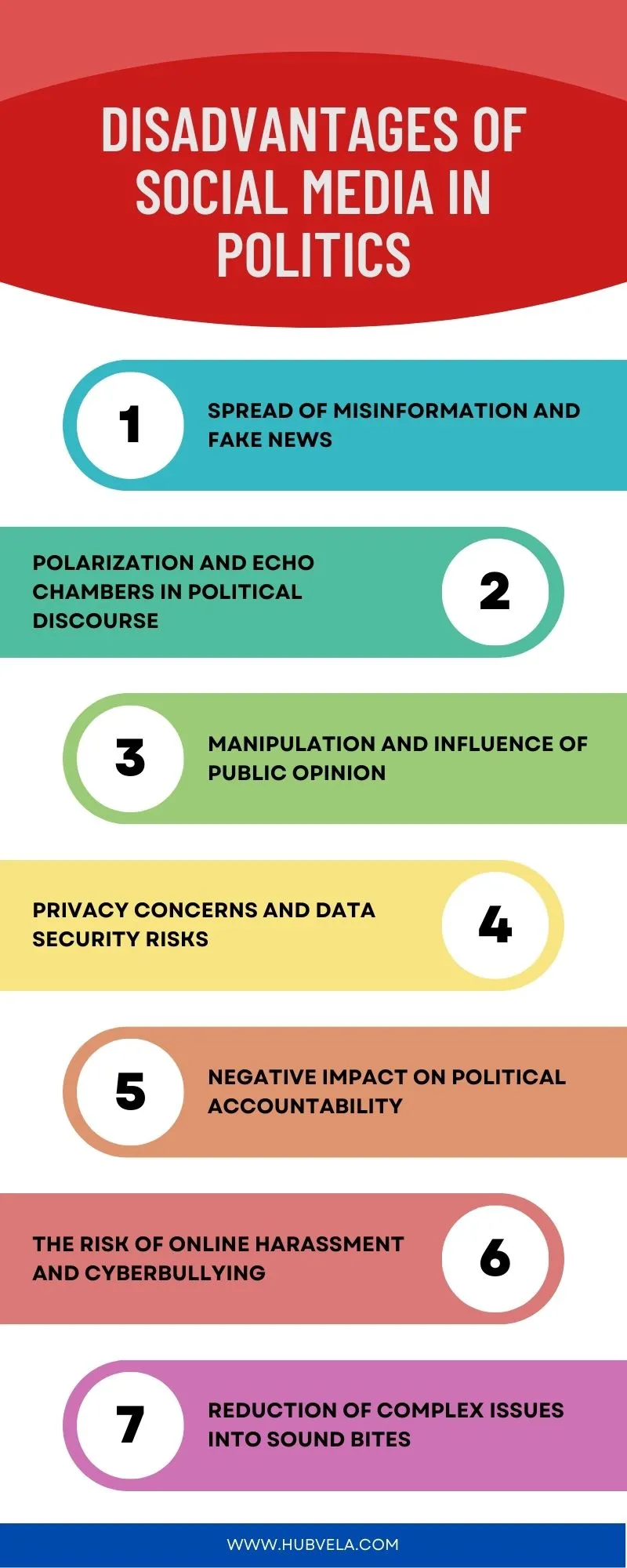Social media has become an integral part of modern-day politics, with politicians and political parties using various social media platforms to connect with voters and get their messages out. Social media has both advantages and disadvantages when it comes to its role in politics.
On the one hand, social media provides a platform for politicians to communicate with the public, allows people to share their opinions on current events and politics, and helps politicians build relationships with voters.
On the other hand, social media spreads propaganda and misinformation, and its use in politics has led to challenges such as the distortion of information by misleading and inaccurate facts.
In this article, we will explore the advantages and disadvantages of social media in politics.

--Advertisement--
Advantages of Social Media in Politics
Social media has become an integral part of our lives, and its impact on various aspects of our society is undeniable. One such area where social media has made a significant impact is politics.
With the rise of platforms like Facebook, Twitter, and YouTube, political discourse has become more accessible than ever before. Social media has enabled politicians to communicate directly with citizens and has encouraged political participation.
In recent years, political campaigns have begun to explore the benefits of social media, and it has become a critical component of their marketing strategy.
We will explore the advantages of social media in politics and how it has revolutionized the way we engage in political discourse.

1. Enhanced Political Awareness and Engagement
One of the significant advantages of social media in politics is the enhanced political awareness and engagement it brings.
Social media platforms provide a space for politicians, political parties, and citizens to share and consume information about political events, policies, and campaigns.
Through social media, individuals can easily access news articles, videos, and live streams related to politics, allowing them to stay informed about current events and issues.
Moreover, social media platforms enable direct communication between politicians and their constituents, fostering a sense of engagement and participation.
Citizens can voice their opinions, ask questions, and provide feedback to politicians, creating a more interactive and inclusive political landscape.
This increased political awareness and engagement facilitated by social media can lead to a more informed electorate and a stronger democracy.
2. Real-Time Information and News Updates
Real-time information and news updates are one of the most significant advantages of social media in politics. Social media platforms like Twitter, Facebook, and Instagram allow politicians to share their views and opinions on current events and issues in real time.
This means that politicians can communicate with their constituents and followers instantly, providing them with up-to-date information on political developments.
Additionally, social media users can follow their favorite politicians and political parties to receive real-time updates on their activities, speeches, and events.
This helps to keep citizens informed and engaged in the political process, which is essential for a healthy democracy.
Furthermore, social media allows for the rapid dissemination of news and information, making it easier for people to stay informed about political events and developments as they happen.
3. Direct Communication Between Politicians and Citizens
One of the significant advantages of social media in politics is the facilitation of direct communication between politicians and citizens.
In the past, communication between politicians and the public was often limited to traditional media channels, such as press conferences and interviews.
However, with the advent of social media platforms like Twitter, Facebook, and Instagram, politicians now have the opportunity to directly engage with their constituents and share their thoughts, ideas, and policies in real time.
This direct communication allows for a more transparent and accessible political process, as citizens can directly interact with their elected officials, ask questions, voice concerns, and provide feedback.
It also enables politicians to gauge public sentiment and gather valuable insights that can inform their decision-making processes.
The direct communication facilitated by social media enhances political participation and fosters a closer relationship between politicians and citizens.
4. Mobilization of Activism and Grassroots Movements
Social media has become a powerful tool for mobilizing activism and grassroots movements. It has revolutionized communication and access to information on both a national and global scale.
Social media can generate awareness, build communities, unite ideas, and share narratives. Studies have found that social media has helped spark many protests through online mobilization, and its greatest impact has been acting more as a megaphone than a rallying cry.
The dissemination of information by sharing local self-generated news has translated into mass and international media, bringing issues and events into the global discussion.
Social media can also be used as a tool not only to mobilize activists but also to broaden the impact of social movements by facilitating meaning-making, resource mobilization, and coalition building.
However, social media also has constraints on movement activity, both structurally through co-option by state agents and in terms of the potential of digital platforms to blur the clear ideology necessary for movements to scale.
5. Increased Voter Participation and Political Discussion
Social media has had a significant impact on voter participation and political discussion. According to a Pew Research Center report, social media is a significant part of the process by which voters are talking about their ballot selections, especially younger voters.
In addition, social media platforms have become a notable venue for people to try to convince their friends to vote.
A meta-analysis published in the journal Information, Communication & Society reviewed existing research on how social media use influences measures such as voting and protesting and found that the correlation between social media use and election-campaign participation “seems weak based on the set of studies analyzed,” while the relationship with civic engagement is generally stronger.
However, a Washington Post opinion piece suggests that social media may have contributed to record voter turnout in the 2020 election.
Social media has the potential to increase political engagement and discussion, but its impact on actual voter turnout remains a topic of debate.
6. Accessibility to Political Candidates and Campaigns
Social media has revolutionized the way political candidates and campaigns interact with voters. With the widespread use of social media platforms, candidates can reach a larger audience and engage with voters in real time.
Social media has made it easier for candidates to connect with voters and share their messages with a wider audience. It has also made it easier for voters to access information about candidates and their policies.
Social media platforms are not under any obligation to run every political ad they receive, and they are free to set their own content policies.
However, social media can be a powerful tool for political campaigns to reach voters, engage with them, and mobilize them to vote. By leveraging the power of social media, candidates can create an effective social media campaign that can help them win elections.
7. Global Reach and Cross-Border Political Dialogue
Social media platforms have revolutionized the way political actors engage with the public and each other on a global scale. These platforms have the potential to connect people from different countries and facilitate cross-border political dialogue.
One of the main advantages of social media in politics is its ability to transcend geographical boundaries and allow politicians, activists, and citizens to communicate and exchange ideas across borders.
The global reach of social media enables political actors to reach a wider audience and disseminate their messages to people around the world.
This has led to the emergence of transnational political movements and the formation of international networks of like-minded individuals.
For example, social media has played a crucial role in mobilizing global protests and social movements, such as the Arab Spring and the Black Lives Matter movement.
Furthermore, social media platforms have facilitated cross-border political dialogue by providing a space for individuals from different countries to engage in discussions and debates.
People can share their perspectives, exchange information, and challenge each other’s viewpoints, regardless of their geographical location.
This has the potential to foster greater understanding and cooperation between nations, as well as promote the exchange of ideas and best practices.
However, it is important to note that the impact of social media on cross-border political dialogue is not without challenges. The rise of digital nationalism and the spread of misinformation and propaganda on social media platforms have also been observed.
The ease with which information can be shared and manipulated on social media has raised concerns about the integrity of political discourse and the potential for the polarization of opinions.
Social media platforms have expanded the reach of political actors and facilitated cross-border political dialogue. They have the potential to connect people from different countries, foster international networks, and promote the exchange of ideas.
However, it is crucial to address the challenges associated with misinformation and digital nationalism to ensure that social media continues to be a force for positive political engagement and global understanding.
Disadvantages of Social Media in Politics
Social media has become an integral part of our daily lives, and its impact on various aspects of society, including politics, cannot be ignored.
While social media has increased political engagement and awareness, it has also contributed to the spread of misinformation and polarization of political discourse.
We will explore the disadvantages of social media in politics. The negative impacts of social media on political discourse include the spread of misinformation and fake news, political polarization, and lack of censorship.
False information can be spread quickly and easily on social media, often without any fact-checking or verification, which can negatively impact political discourse and undermine public trust in democratic institutions.
As social media continues to play an increasingly important role in politics, it is crucial to understand its disadvantages and how they can be mitigated.

1. Spread of Misinformation and Fake News
The spread of misinformation and fake news is a significant concern when it comes to the role of social media in politics.
With the ease and speed at which information can be shared on platforms like Facebook and Twitter, false or misleading information can quickly go viral and reach a wide audience.
This can have serious consequences for the political landscape, as it can shape public opinion, influence elections, and undermine the democratic process.
The lack of fact-checking and verification on social media platforms allows for the rapid dissemination of misinformation, making it difficult for users to distinguish between what is true and what is false.
This phenomenon has been particularly evident in recent years, with numerous instances of fake news stories spreading like wildfire, often with detrimental effects.
It is crucial for individuals to be critical consumers of information and to rely on reputable sources when engaging with political content on social media.
2. Polarization and Echo Chambers in Political Discourse
Social media has been linked to political polarization, which occurs when individuals become more ideologically extreme and less willing to compromise with those who hold opposing views.
Echo chambers, or situations where individuals are exposed only to opinions that agree with their own, are a growing concern in the political discourse of democratic countries.
Social media can exacerbate exposure to echo chambers, especially in the right-leaning community.
Exposure to opposing views on social media can increase political polarization, as social media sites are often blamed for creating echo chambers that prevent people from being exposed to diverse viewpoints.
Political polarization becomes harmful when it segregates social networks and excludes information about the preferences of people other than close associates.
3. Manipulation and Influence of Public Opinion
Social media has become a powerful tool for political actors to manipulate and influence public opinion, which is a growing threat to democracies around the world.
Social media platforms offer a direct connection to people, allowing for the spread of fragmented ideas and extreme views, which can lead to political polarization and lack of censorship.
Social media campaigns can amplify conspiracy theories, and doubts about democratic institutions and processes, and diminish democratic norms, especially in weak liberal democracies.
The social media algorithm is designed to offer everyone information that best meets their interests and views, according to data provided by the user themselves, which can lead to the dissemination of fake news and disinformation during an election process.
Social media can also be a breeding ground for online harassment and hate speech, which can have a chilling effect on political discourse and discourage people from participating in political discussions and debates.
Therefore, the manipulation and influence of public opinion through social media can have a negative impact on politics and democracy.
4. Privacy Concerns and Data Security Risks
Privacy concerns and data security risks are significant disadvantages of social media in politics. Social media platforms collect and retain massive amounts of personal data, which can be vulnerable to hacking, scraping, and data breaches.
The data at risk can include location information, health information, religious identity, sexual orientation, facial recognition imagery, private messages, personal photos, and more.
Moreover, sensitive user information may be at risk even with privacy laws, and scammers can find enough information to spy on users, steal identities, and commit fraud. Social media can also be a source of bullying, emotional and psychological attacks, and impersonation.
Social media users’ concerns about their privacy have spiked in recent years, and these growing privacy concerns have prompted advocacy for tighter regulations.
Therefore, it is crucial to implement all the protection tips and follow proper deletion procedures when using social media.
5. Negative Impact on Political Accountability
Social media has had a negative impact on political accountability, according to an article by the Law and Internet Foundation.
The emergence of social media platforms has allowed people to share their opinions on public issues unilaterally, without the need for journalistic intermediaries.
This has led to a lack of editorial responsibility regarding political messages, which can result in the spread of misinformation. Political actors are now creating media content themselves, using unreliable sources of information and data.
The social media algorithm is designed to offer users information that best meets their interests and views, which can contribute to partisan animosity and extreme polarization.
The spread of misinformation can worsen political instability and legitimize mass atrocities, particularly in contexts where there are weakened legal and institutional constraints on executive authority.
However, exposure to new ideas and viewpoints via social media can occasionally cause people to change their minds about political issues or candidates.
6. The Risk of Online Harassment and Cyberbullying
The risk of online harassment and cyberbullying is a significant disadvantage of social media in politics. With the anonymity provided by the internet, individuals can easily hide behind fake profiles and engage in abusive behavior towards others.
This can have serious consequences for politicians, who may be subjected to personal attacks and threats of violence.
The prevalence of online harassment and cyberbullying can also discourage individuals from participating in political discourse, particularly those from marginalized communities who may already face discrimination and prejudice.
As a result, social media can become a breeding ground for hate speech and intolerance, undermining the democratic ideals of free speech and open debate.
It is important for policymakers and social media companies to take steps to address this issue and ensure that online spaces are safe and inclusive for all users.
7. Reduction of Complex Issues into Sound Bites
The reduction of complex issues into sound bites is a significant disadvantage of social media in politics. Social media platforms often prioritize brevity and simplicity, which can lead to the oversimplification and distortion of complex political issues.
The limited character count and attention span on social media make it challenging to convey nuanced arguments and policy details.
This can result in the spread of misinformation, as complex issues are condensed into catchy slogans or misleading headlines.
The reduction of political discourse into sound bites can hinder meaningful and informed discussions, leading to polarization and a lack of understanding among the public.
It is important for users to critically evaluate the information they encounter on social media and seek out reliable sources for a comprehensive understanding of political issues.
Conclusion on Advantages and Disadvantages of Social Media in Politics
In conclusion, social media has both advantages and disadvantages in politics. On the positive side, social media can be a powerful tool for political campaigns, allowing politicians to connect with voters and share their ideas with a large audience.
Social media can also be a source of political learning, as users engage in online discussions and share information with each other. However, social media can also contribute to political polarization and the spread of fake news and disinformation.
In addition, the research agenda for studying the effect of social media on democracy runs the risk of being biased by the kind of data platforms made available to researchers.
Overall, it is clear that social media has had a significant impact on politics, but it is up to policymakers and users to ensure that its use is responsible and beneficial for democracy.


